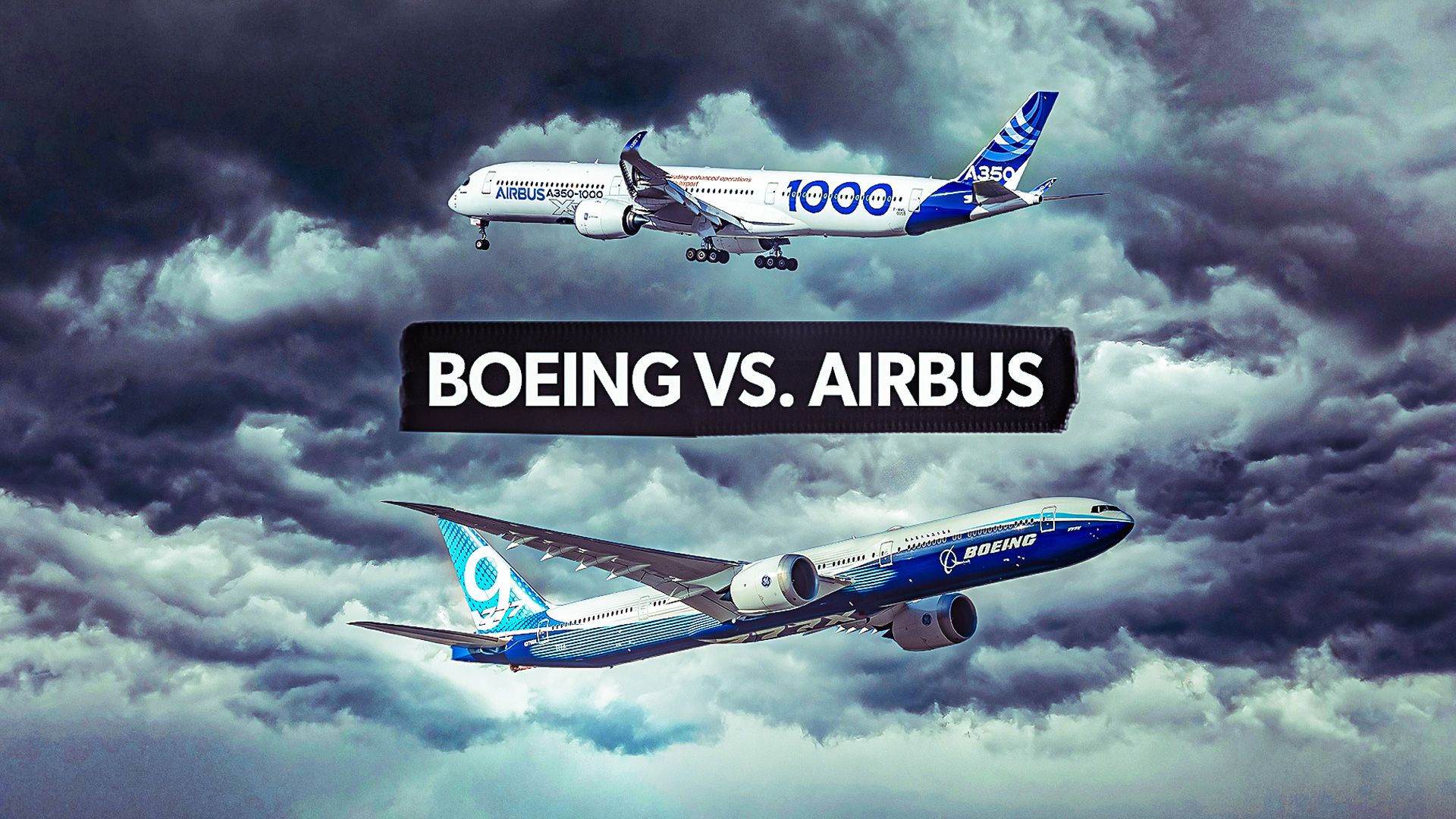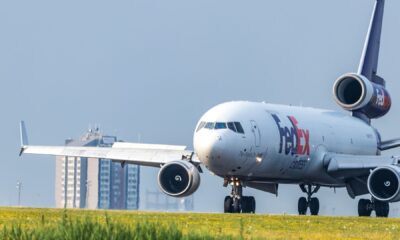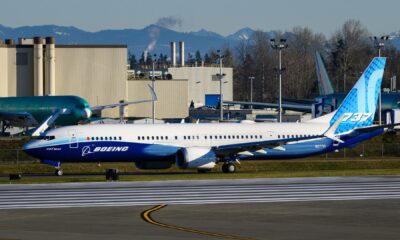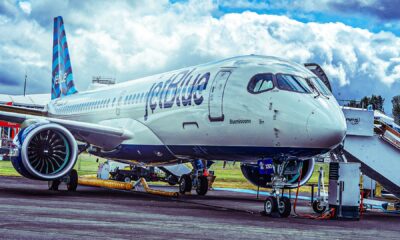World
Airbus Surpasses Boeing in Aircraft Deliveries as 2020s Progress

In a significant shift in the aviation industry, Airbus’ narrowbody A320 family has overtaken Boeing’s 737 series to become the best-selling commercial jet of all time. This milestone was marked when Airbus surpassed the 12,250 delivery mark, while Boeing continues to face challenges with its 737 MAX production. As the aviation sector navigates the complexities of the 2020s, it raises the question: which aircraft manufacturer is leading the market?
The answer is clear—Airbus has maintained a consistent edge over Boeing in aircraft deliveries, particularly following the troubles that plagued Boeing after the fatal crashes of the 737 MAX in 2019 and the ensuing disruptions caused by the COVID-19 pandemic. Airbus has effectively launched its new models, including the A320neo, A330neo, and A350 series, while Boeing grapples with the certification of two out of four 737 MAX models and the long-delayed 777X widebody aircraft.
Production Performance Review
Looking at production numbers, Airbus has projected a total production goal of 770 aircraft for 2025, slightly adjusted from its initial target of 820. In contrast, Boeing has not disclosed a public target for its production, but estimates suggest deliveries may be around 600 by the end of the year. This indicates Airbus is likely to maintain a lead of over 20% in deliveries for 2023, continuing a trend established since 2020.
The year 2020 was particularly challenging for Boeing, with monthly production dropping to a mere 10-20 planes due to the grounding of the 737 MAX following critical safety investigations by the Federal Aviation Administration (FAA). The following table illustrates the stark contrast in yearly deliveries between the two manufacturers since 2020:
– **Year**: 2020 | **Boeing Deliveries**: 157 | **Airbus Deliveries**: 566
– **Year**: 2021 | **Boeing Deliveries**: 340 | **Airbus Deliveries**: 611
– **Year**: 2022 | **Boeing Deliveries**: 480 | **Airbus Deliveries**: 663
– **Year**: 2023 | **Boeing Deliveries**: 528 | **Airbus Deliveries**: 735
– **Year**: 2024 | **Boeing Deliveries**: 348 | **Airbus Deliveries**: 766
In 2020, Airbus delivered more than three times the number of aircraft compared to Boeing. This trend persisted into 2022, where Airbus again achieved more than double the deliveries of its American counterpart, largely due to Boeing’s ongoing quality control issues.
Comparative Analysis of Flagship Models
The recent production figures further highlight the shift in market dynamics, particularly with the Airbus A320 series now recognized as the most delivered aircraft in history, surpassing the previous champion, the 737. The A320neo, which entered service in 2016, has been well received for its efficiency and reliability, contributing to a backlog of 7,262 orders for Airbus.
Boeing’s challenges with the 737 MAX, including a capped production rate of 38 jets per month under FAA oversight, hinder its ability to compete effectively. In contrast, the A350 has been in service for over a decade, with Airbus ramping up production for its higher-capacity A350-1000 model.
Boeing’s flagship, the 777X, remains in limbo, yet to receive FAA certification and nearly five years behind schedule. This delay has not only affected Boeing’s current standing but also reflects issues in its leadership and engineering capabilities. Recent statements from Boeing’s CEO, Kelly Ortberg, indicate that deliveries of the 777X will not commence until 2027.
As Airbus continues to innovate and adapt in a post-pandemic market, it has positioned itself for a robust recovery, while Boeing faces critical scrutiny over its operational practices and production timelines. The merger with McDonnell Douglas in 1997 has been cited by industry analysts as a turning point that shifted Boeing’s focus from engineering excellence to financial considerations, contributing to current challenges.
The ongoing global supply chain issues, exacerbated by the pandemic, further complicate production for both manufacturers. Airbus faces delays with its backlog of aircraft awaiting engines from suppliers, while Boeing strives to enhance quality control following its merger with Spirit AeroSystems, a key supplier for its 737 MAX production.
As the aviation industry progresses through the 2020s, the competition between these two aerospace giants will remain a focal point, influencing not only market dynamics but also the future of air travel technology.
-

 Politics4 weeks ago
Politics4 weeks agoSecwepemc First Nation Seeks Aboriginal Title Over Kamloops Area
-

 World5 months ago
World5 months agoScientists Unearth Ancient Antarctic Ice to Unlock Climate Secrets
-

 Entertainment5 months ago
Entertainment5 months agoTrump and McCormick to Announce $70 Billion Energy Investments
-

 Science5 months ago
Science5 months agoFour Astronauts Return to Earth After International Space Station Mission
-

 Lifestyle5 months ago
Lifestyle5 months agoTransLink Launches Food Truck Program to Boost Revenue in Vancouver
-

 Technology3 months ago
Technology3 months agoApple Notes Enhances Functionality with Markdown Support in macOS 26
-

 Lifestyle3 months ago
Lifestyle3 months agoManitoba’s Burger Champion Shines Again Amid Dining Innovations
-

 Top Stories2 months ago
Top Stories2 months agoUrgent Update: Fatal Crash on Highway 99 Claims Life of Pitt Meadows Man
-

 Politics4 months ago
Politics4 months agoUkrainian Tennis Star Elina Svitolina Faces Death Threats Online
-

 Sports5 months ago
Sports5 months agoSearch Underway for Missing Hunter Amid Hokkaido Bear Emergency
-

 Politics5 months ago
Politics5 months agoCarney Engages First Nations Leaders at Development Law Summit
-

 Technology5 months ago
Technology5 months agoFrosthaven Launches Early Access on July 31, 2025





















